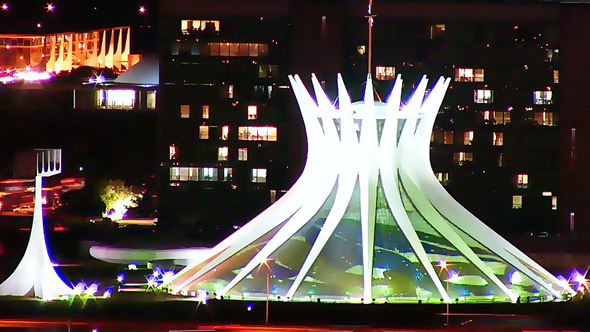Brazil ICT: High Tech Industry in Brasilia
The Digital Capital Technology Park is on its way and major advances have been made on behalf of the project that intends to leverage not only the sector of Information Technology and Communication, but the entire production chain of the Federal District, with impacts on the Brazilian economy.

Sistema Fibra – Digital Capital Technology Park
After some years of political and bureaucratic impediments, the Digital Capital Technology Park has taken steps forward. In recent weeks, major advances have been made on behalf of the project, which intends to leverage not only the Information Technology and Communications sector, but the entire Federal District production chain, with a corresponding effect on the Brazilian economy. The Federal District government reformulated the project and decided to invest in the formation of a Proposal Specific Society (PSS) to administer the process and ensure that deployment takes place. Terracap, which holds a 47% stake, will launch bidding for those interested in the society this month through a Public Private Partnership (PPP) with no competition requirements. The public company shall step in immediately taking control of the land and the infrastructure works that have already been carried out at the site.
The hub brings with it technological features capable of attracting competitive brands from around the country and of international standard. It is predicted that around 1,200 companies will be installed, generating almost 25,000 direct jobs.
The Federal District industry understands that the Technology Park wins legitimacy and greater transparency through this sustainable model that brings the private sector in not only as an investor, but as a partner. Industry leaders are looking at the new impetus given to this project – which has been around for the same age as a teenager without ever having left nursery – with enthusiasm. The Federal Capital’s IT sector – which includes more than 700 companies, employing 30,000 people – is longing for this birth.
The hub brings with it technological features capable of attracting competitive brands from around the country and of international standard. It is predicted that around 1,200 companies will be installed, generating almost 25,000 direct jobs. The creation of new jobs will enable the generation of income for families with an impact on other economic segments of the Federal District. An important indicator, as the Federal Capital is saturated with the traditional dependence of public administration and has rung warning bells regarding the diversification of our economy.
Recent data from the 2011 GDP outlines a scenario of growing concern about the wealth produced by the Federal District, with an insignificant increase of 2.4% compared to 2010 – slightly lower than the national average. The dynamism of Brasilia‘s consumption is significant, but we are seeing a growing trend in reduction in investment in pay slips paid by the government as a means of controlling public spending, even with transparency measures in order for the society to have control over wages.
When we see the country getting to the point of taking sharp cuts in the state machine itself, we identify a strong paradigm shift caused by adaptation to the standards being demanded by world economy. Brazil has become increasingly distant from the top of competitiveness rankings and the race for technological development, which has arguably become the axis of modern life, emerges as the only way out. In times of wavering crises, victory will be given to those countries that bet everything on the development of knowledge to enable them to be ready to obtain the degree of competitiveness inherent to survival in the era of globalization. In Brazil, economic development must therefore be based on the creation of appropriate conditions for the IT industry’s expansion. Brasilia is able to augment this sector with the provision of labour, higher education courses in all areas of information technology and logistics both within the country and throughout the continent. Creating, therefore, this intelligence hub represents a decisive political wager for economic development as much as when it sought to put the Federal Capital in the centre of the Country.
The initiative – actually, at times the old project has been disparaged – to create a technology park as an international benchmark, capable of attracting large global conglomerates and massive investments, is increasingly close to stepping out of the virtual realm. The technological hub will allow Brasilia to take a great leap towards sustainable economic development with an audacious, but attainable flight plan. After all, the creation of the new Capital of the Republic itself is a manifestation of a daring project that aimed to positively affect the whole country. Almost sixty years later, we are here trying once again to bring the focus to the central region. Our Silicon Valley is just as possible as the greatest work of JK was.**
**JK refers to Juscelino Kubitschek de Oliveira, former President of Brazil and mastermind of the plan to create Brasilia and move the nation´s capital from Rio de Janeiro to Brasilia.